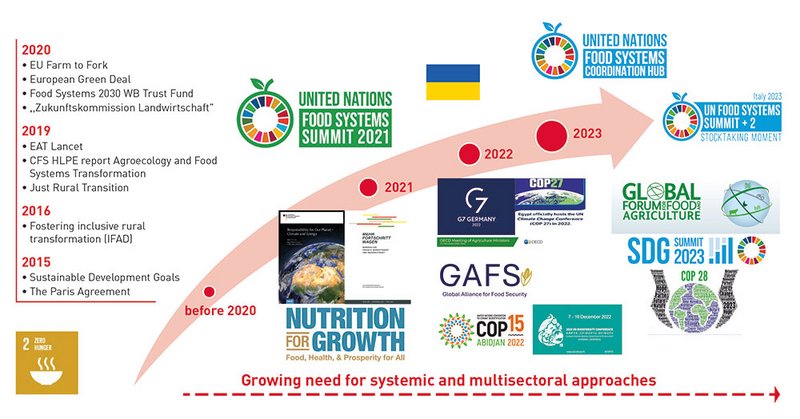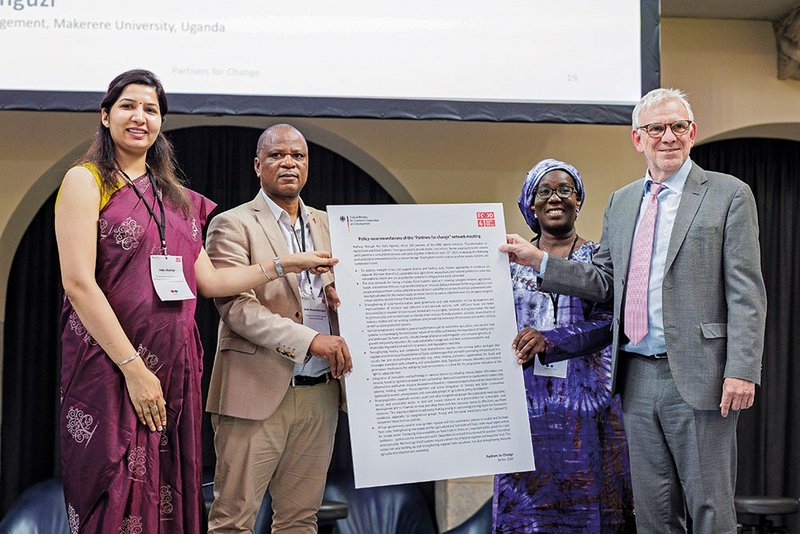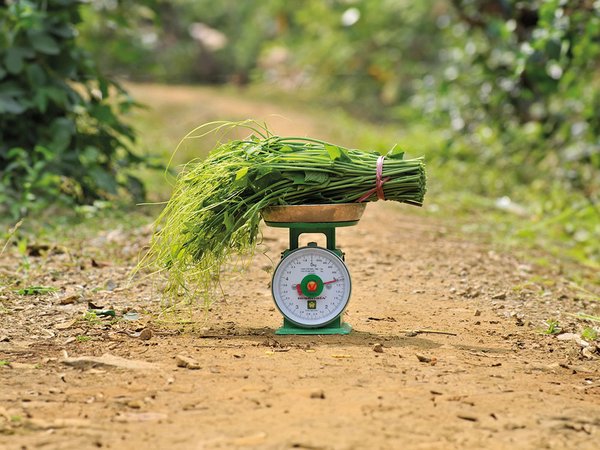 Download this article in magazine layout
Download this article in magazine layout
- Share this article
- Subscribe to our newsletter
Transforming agricultural and food systems – why and how
With an average 122 million more people pushed into hunger since 2019 due to multiple crises, the Sustainable Development Goal 2 of ending hunger by 2030 will not be reached. This was the bitter assessment by the UN Food and Agriculture Organization (FAO), the World Food Programme and the World Health Organization in July 2023 – just two months ahead of the United Nations 2023 SDG Summit in New York/USA marking the half-way set to achieve the 2030 Agenda.
Current agricultural and food systems not only fail to provide sufficient, affordable and nutritious food, but also destroy their very own ecological foundations. They account for 23 to 42 per cent of global greenhouse gases. Eighty-six per cent of species listed as threatened are at risk from agricultural activities, leading into a biodiversity crisis. Agriculture is responsible for 70 per cent of global freshwater consumption. The impacts of climate change have already reduced global agricultural productivity by around 21 per cent since 1961. German Federal Ministry for Economic Cooperation and Development (BMZ) State Secretary Jochen Flasbarth got to the point in a conversation with the African Union (AU) and the World Bank in Berlin in January 2023, stating: “Our current agri-food systems are galaxies away from sustainability.”
Against this gloomy background, consensus grows on what is urgently needed: a profound transformation of global agricultural and food systems that provides the global population with sufficient and healthy food within the planetary boundaries. In 2019, the concept of transforming agricultural and food systems finally resonated internationally with the High Level Panel of Experts on Food Security and Nutrition (HLPE) report Food security and nutrition: building a global narrative towards 2030. Since then, key actors and institutions have embraced this comprehensive concept at international level. The United Nations Food Systems Summits (UNFSS) in 2021 accelerated the momentum, and food system transformation has played an ever-increasing role at the United Nations Framework Convention on Climate Change (UNFCCC) COPs (see Figure).

According to the widely accepted HLPE definition, agricultural and food systems encompass all core elements and activities from inputs at pre-production, agricultural production and supply chains to retail, food environments and consumption of food. It considers drivers of change in food systems such as environmental factors, policy, markets and demographic, social and cultural trends. Food system outcomes are the heart of the concept – impacts on human health, society, economy, and the environment. Piecemeal action will not do, as transformation means major and disruptive changes. Transformation levers can be conceived as areas of work that have the potential to bring about broad positive change beyond their immediate focus. Key levers for global-scale transformation across international reports can be identified as follows: policy, governance and institutions; research, technology and innovation; food finance architecture; (international) trade and food supply chains; food production architecture; and education, (nutrition) knowledge and consumer awareness.
So, what is new you might wonder – is this not just a more comprehensive yet more complex approach summarising everything we are already doing? We beg to differ – as the approach does feature key paradigm shifts that can introduce real changes to how we do things in international cooperation. Firstly, promising single options are no silver bullets, but need to be intentionally combined into innovation bundles to realise their potential for solving real human challenges. Secondly, the realisation stands central that transformation of agricultural and food systems requires systemic approaches with collaboration across sectors, most importantly, combining long-separated agriculture, nutrition/human health and climate/biodiversity. Thirdly, as a systemic concept, trade-offs are an inherent part – win-win outcomes are not always on the table, and we have to identify and address trade-offs, negotiate acceptable solutions for losers and make sure that disruption results in socially just transformation. Fourthly, we have to shift our focus to systemic change at structural levels, with renewed attention to building evidence-based policy and finance systems.
Global debate sparking locally owned context-specific transformation pathways
All conceptual considerations are only worth the paper they are written on if we manage to translate this important international debate into meaningful action on the ground. Let us state the most important thing upfront. There is no single global blueprint for the transformation of agricultural and food systems. Neither should there be! As much as challenges are context-specific, so are solutions and transformation pathways. Agricultural and food systems vary considerably across the globe, from rural systems that are dominated by smallholder farmers, subsistence and fragmented markets and oftentimes hunger and malnutrition to industrialised systems with global market participation, high food availability, obesity and environmental pollution. Transformation pathways are in no way linear, but what stands central is a locally determined, desirable combination of productive and economic, sustainable, healthier, resilient, inclusive and equal food system outcomes.
So, if solutions are locally owned and determined, what can the global debate on transformation of agricultural and food systems add to the game? We argue that the transformation of global agricultural and food systems is a global challenge, and that as such, it requires international collaboration. Global agendas, debates and narratives can provide inspiration and orientation, set principles and priorities, and contribute to building one leading vision.
Agricultural and food systems across the globe are characterised by strong, yet often diverting interests. Negotiating priorities in weighing outcomes and trade-offs involves a deliberate process of societal debate at national and sub-national level. Transformation pathways need to be developed at national level and be implemented locally; this was one key result of the 2021 UNFSS. The Stocktaking Event UNFSS+2 in Rome, Italy, in July this year has shown that a number of countries have started to define their pathways and have gathered strength to walk their path, no matter how stony it may be. The defined entry points to national pathways differ and follow different paradigms, varying from climate-smart agriculture in Kenya to sustainable intensification of food production in Zambia, to natural farming in India and agroecology in Mali and Burkina Faso. No matter what the national focus may be, it will be important to monitor not only national progress but also agri-food system outcomes and the aforementioned trade-offs for a just transformation.
Strategy and engagement of German international cooperation
The role of international cooperation in this context is rather clear: to consistently support and to finance the global agenda of agriculture and food systems transformation towards more sustainability and resilience, and to engage strategically at the level of regional institutions to support transformative efforts e.g. at African Union level, while at the same time providing direct and tangible support to national implementation at country level towards achieving SDG 2.
The German government has set itself a respective framework document. The BMZ Core Area Strategy “Sustainable Agri-Food System Transformation” states that food systems “must be more effective and more efficient, be resilient to shocks of all kinds, and be set up in an environmentally, economically and socially sustainable manner that will enable them to contribute to income and employment, overcome poverty, and create prosperity. The rights and interests of producers – in particular small-scale producers – need to be balanced fairly against those of consumers. Protecting the climate and conserving natural resources, such as land, water and biodiversity, are also essential factors for well-functioning agricultural and food systems.”
This can only be achieved by the aforementioned multilevel as well as multisectoral and multi-stakeholder engagement – including agriculture, health and environmental institutions as well as public, private, science and civil society actors. While governments and science in many countries have been central to the development of agri-food transformation pathways, civil society and, in particular, private sector engagement lags behind and needs to be stepped up. In the context of food value chains development, German development cooperation has vast experience of participatory engagement that will be of use here.
It is further necessary to distinguish between short-, medium- and long-term activities: implementing the necessary transformation encompasses various aid and development instruments that impact at different times. Examples of BMZ’s very immediate interventions include the formation of the Global Alliance for Food Security (GAFS) jointly with the World Bank as well as the international conference “Uniting for Global Food Security” in June 2022 as direct answers to the food security threats of the Russian war against Ukraine. As a network of global decision-makers, GAFS has since demonstrated international unity, and a World Bank-managed dashboard now tracks many food security activities and indicators for all affected countries in a transparent manner. In addition, in 2022, Germany spent 3.5 billion euros on food security – more than ever before – for emergency measures as well as for transformative purposes such as the investments in the multi-donor trust fund “Food Systems 2030”.
Examples of medium-term engagement for transformation are:
- The G7 initiative “CompensAction for food security and a healthy planet” (also see Box) which, jointly with the International Fund for Agricultural Development (IFAD), pilots and scales compensation measures for smallholder farmers in various countries for their measurable engagement in prioritising the protection of natural resources over agricultural exploitation (payments for ecosystem services); and
- German support of what is known as the repurposing agenda, which aims at transforming the way public money is spent in agriculture, namely a repurposing of environmentally harmful agricultural subsidies.
CompensAction rewards farmers for climate services
CompensAction was launched in July 2022 by Germany’s Federal Ministry for Economic Cooperation and Development (BMZ) under the country’s G7 Presidency. The initiative aims to promote Payment for Ecosystem Services (PES) innovations at scale in order to thus provide farmers with incentives for nature- and climate positive agriculture. Ecosystem services can include CO2 storage, water and soil conservation, biodiversity conservation and other activities, for all of which farmers receive compensation.
CompensAction is to enhance smallholder income in low- and medium-income countries. For this purpose, supported by the International Fund for Agricultural Development (IFAD), the initiative has already started the first pilot projects. In Ethiopia, for example, it is supporting forestry. The project aims to introduce sustainable farming practices on 25,000 hectares of land which sequester at least 2.2 tonnes of CO2 equivalent, i.e. a range of different greenhouse gases, per hectare and year. In addition, more than 8,000 households are to raise their income by trading emissions credits. In Brazil, the initiative is supporting the development of a financing system for deforestation-free value chains. This is to enable the sustainable management of around 10,000 hectares of forests together with 1,500 families from 2024 on. In Lesotho, there is a national fund for the payment of ecosystem services such as saving water while working or the conservation of biodiversity. The scheme is to reach up to 40,000 people.
CompensAction is being implemented by Deutsche Gesellschaft für Internationale Zusammenarbeit (GIZ) GmbH together with the think-tank Clim-Eat, based in Wageningen in the Netherlands.
More information: https://compensaction.com
Concerning long-term engagement, Germany has stepped up its engagement to put the transformation of agricultural and food systems at the heart of multilateral agendas in the leading UN processes and pertinent Conferences of the Parties (COPs), notably COP27 and COP28 of the UNFCCC, COP15 of the UNCCD, COP15 of the Convention on Biodiversity and the UN Food Systems Summits. The former special initiative “One World – No Hunger” will be continued as the special initiative “Agricultural and Food System Transformation” to implement the BMZ Core Area Strategy. Several new global programmes are to implement the transformative agenda at global, regional and country level. Agreements on activities are underway with a number of partner countries, such as Burkina Faso, Cameroun, India, Kenya, Madagascar, Nigeria, Togo and Zambia.
Halfway through Agenda 2030, the BMZ invited selected partners of its special initiative to the network meeting ‘Partners for Change’ in June 2023. Around 250 partners and representatives from politics, science, the private sector and civil society convened in Berlin to develop policy recommendations for the transformation of agricultural and food systems based on the experience gained from implementation. The final product, a joint political commitment, includes action based on multi- and cross-sectoral approaches, seeking coherence across all levels (see Photo).

From left to right: Indu Jakhar (Government of Maharashtra, India), Moses Musinguzi (Makarere University, Kenya) and Ella Compaoré (Ministry of Health and Public Hygiene, Burkina Faso) handing over the jointly developed policy recommendations to BMZ State Secretary Jochen Flasbarth. Photo: Photothek, 2023
Putting things into perspective – what’s the way forward?
Looking forward, what are the next frontiers in transformation of agricultural and food systems? We see at least four areas of tension and potential conflict – which are nonetheless the areas where crucial progress needs to be achieved:
- Continuity vs. disruptive change of transformation: When it comes to bilateral and multilateral cooperation, disruptive change is not engrained in institutional cultures, nor does it conform with a need for a certain degree of continuity for longer-term development measures. This is threatening the transformative agenda to be watered down by putting old wine in new bottles.
- Complexity vs. operational need for simplicity: While transformative approaches as systemic approaches finally appreciate the complexity of agri-food systems, operational structures often require sufficient simplicity to be implemented effectively. There is a danger of either getting lost in complexity or continuing business as usual by reducing complexity too much for the sake of operationalisation.
- Policy vs. private sector engagement: The renewed emphasis on transformative policies so far focuses primarily on political agendas and strategic statements and events and therefore naturally concentrates largely on public actors in international, regional and national institutions. However, we need to keep in mind that the food economy in Africa alone is estimated to be worth 18 times more than all development assistance on the continent. There is this big private sector elephant in the room, and we need to work harder to effectively engage private sector stakeholders in the agri-food transformation for development.
- Local implementation vs. global progress monitoring: It is acknowledged that the transformation of agricultural and food systems needs to be locally owned, context specific and nationally led and implemented. However, for a global transformation agenda to be pursued, we need global comparative measures to track progress towards its outcomes. We need to avoid shying away from universally comparable indicators, for if we don’t dare to measure and compare, we don’t know whether we are progressing. Let’s bear in mind that “What gets measured gets done”.
Way too many people are still going hungry as climate change progresses. The accelerating and overlaying crises of the past years show us that we will not achieve the SDGs with incremental changes. A total turnaround is necessary towards sustainability, resilience and human health. And for this, we need all hands on deck – from climate science to agriculture, rural development and health – to at least attempt to master the enormous task of agricultural and food systems transformation.
Heike Höffler is an agricultural economist and Deutsche Gesellschaft für Internationale Zusammenarbeit (GIZ) GmbH project manager for the Food and Nutrition Security, Enhanced Resilience (FANSER) Project, based in Lusaka, Zambia. She has worked in various positions for GIZ in Kenya and Germany over the last 20 years. She holds a PhD in African Studies from the University of Leipzig, Germany.
Birthe Paul is an environmental and agricultural scientist and advisor in the sector project agriculture at GIZ, based in Bonn, Germany. She holds a PhD in Production Ecology & Resource Conservation from Wageningen University in the Netherlands. Before joining GIZ, she worked for ten years as a scientist at the International Center for Tropical Agriculture (CIAT) in Kenya.
Pierre Pascal Cerdan Castagnola is a peace researcher and junior advisor in the sector project agriculture at GIZ, based in Bonn. He holds an MA in Peace Research and International Politics from the University of Tübingen, Germany. Before joining GIZ, he gained various experiences in development cooperation, among others with different NGOs and foundations in Mexico.
Contact: heike.hoeffler@giz.de





Add a comment
Comments :